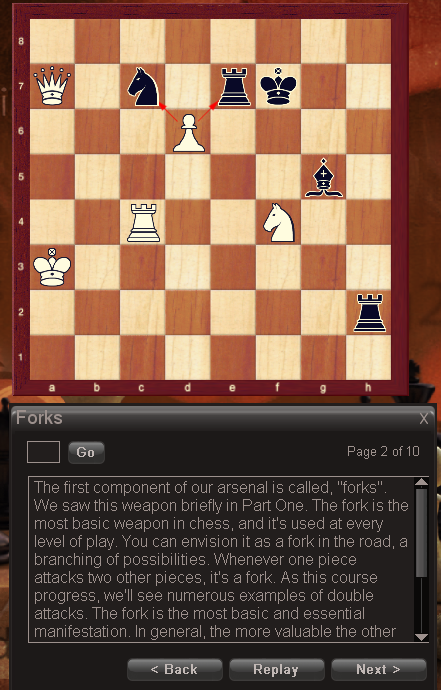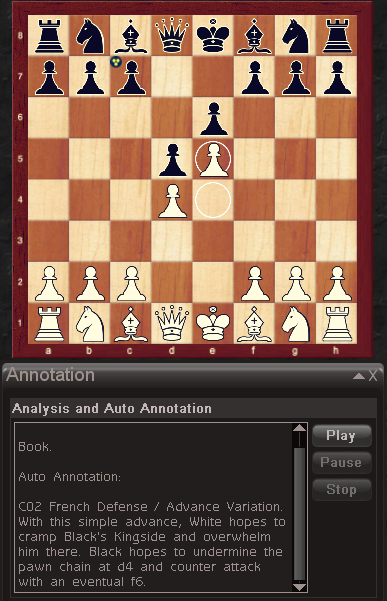Introduction
I am not a very good chess player, although I have played for 25 years. My FICS rating is below 1800. So you may first consider a chess learning guide by someone more experienced. This guide might still help when you want the opinion of someone in the same class.
One thing I have been planning for over 10 years is to improve my chess skills by a whole level. This year I did, and I was stunned by the great new ways that computers and the internet offer for beginners and intermediate players to learn, compared to what I had in the 80s.
Interactive Tutorials
I found it far more effective to use an interactive tutorial than to read a book. A good interactive tutorial asks questions, like tiny exercises, which force the reader to do something on the board. The additional gain compared to reading a traditional chess book is huge. The solutions that are out there do not fulfil all my dreams, but they are quite nice.

- Chessmaster Grandmaster Edition has many tutorials. The most helpful one for me was the one by Josh Waitzkin. It taught me not only the direct chess strategies I needed to get to the next level, but also to express myself with chess as a form of art and to develop my character and my personality along with my chess skills. Chessmaster Grandmaster Edition is very affordable, but hard to get in some countries.

- The interactive mentor at chess.com is also available as stand alone software at http://www.chessmentor.com/. Either are very expensive (the web version is a subscription with a monthly fee). Another weakness is that it doesn’t have many features compared to Chessmaster. It is a very primitive software. For example most moves are not shown on the board and are just there to read in PGN, so I end up having a hard time following it, similar to reading a book. But the lessons have a high degree of interactivity and are of a very high quality. Especially regarding positional play and middle game strategy it covers many things that Chessmaster doesn’t cover well, and it does so at a very high level. Most lessons have been created by the renowned IM Jeremy Silman. All lessons require to be solved on the board by making a particular series of moves. When the user makes a “wrong” move it sometimes is explained very well why it is wrong or that it is fine, too, but in some cases it isn’t. But it is impressive how many possible answers are covered and properly commented. Anyway, that’s basically all it does. That’s about 3 % of the features Chessmaster has to offer. But really, great quality, very valuable information.
Post-game computer analysis
This is such an incredible help! After I played a game (against a computer or against a human) I always feed it to a computer and get an incredibly useful analysis. It comments on my moves, finds all tactical blunders and so on. You can’t imagine how much this has helped me to get better! While it doesn’t miss any tactical opportunity, it is no help for strategy at all. That would require a human mentor to look at my games. The next best thing are probably the positional and strategy lessons of Chess Mentor (see above). They present a position in the late opening or middle game and then require to find a good strategy to be provided by a sequence of moves.
- Chessmaster Grandmaster Edition can analyse any game in PGN format with short algebraic notation.
Pro: It has audio output and comments on more aspects than any other analysis software I tried. For example when I do a particular unusual opening move it says something like: “Ah, interesting. That’s the Steinitz Attack. Some guy named … has used it around 18.. with great success. It became less popular when …d6 has been discovered. After that move white has no advantage left from this move. (…)” Such facts become very interesting when they refer to a game I just played, as boring as they would otherwise be! Another advantage is that it directly says why my move is not good.
Contra: It is inconvenient to browse the move alternatives slowly and manually and to try additional variations.

- Common chess engines like Crafty can be plugged into a fool-proof frontend like BabasChess.
Pro: Great navigation options to browse the suggested alternatives, very easy to let the computer answer “but…” and “what if” and “but what if …” questions regarding its own suggestions or anything at all, actually. Chessmaster Grandmaster Edition might leave you alone with troubling thoughts like “I don’t have a good feeling about the alternative it suggested. It only works because black plays along in move x.” while the combination of a chess engine and such a frontend will easily show any subvariation you can think of. It’s like a neural interface.
Contra: The output follows a primitive scheme, while in Chessmaster Grandmaster Edition you have the feeling of being mentored by an AI from the future. No comments on opening moves at all, and no explanations like “this is a better move because it pins the black knight to the black queen”, which Chessmaster can provide.
Game explorers
When studying openings I found it very disturbing that often the main line could easily be disrupted by a move that looks far greater. The books don’t say anything about such variations. There are many, many moves in the openings and early middle games that look great, and it is very hard to find out why they are not great and what to do if someone plays them. Game explorers help to see what grandmasters played against an unusual, but not entirely far-fetched move. They are great to learn a particular class of opening moves or repeating early middle game lines. When I read a book back in the 80s it always left me alone with thoughts like “But that will never work when black does …” and then when I tried it black does exactly that, and I was still helpless and would better not even have started to read about it.
- chess.com has a good one, but it is not free
- Red Hot Pawn has a free one, but there are not enough professional games in the data base to make it really useful